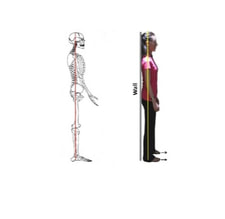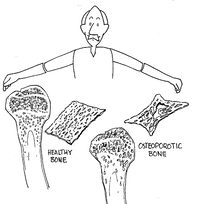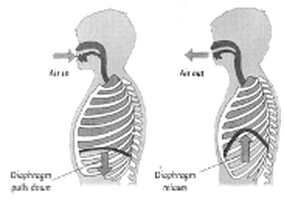Posture is Important We all take our posture for granted and rarely think about how our activities affect our posture and how our posture affects our health. Many of us don’t even know what good posture looks like. Here are a few tips from our friendly physiotherapist. Poor posture can lead to pain, discomfort and loss of function. For example:
Good posture is the position of the body puts the least strain on the muscles and joints. Your posture is good when the shoulders are down and the back and the three natural curves of the spine are maintained while standing, sitting, lying down or being active. What does good posture look like? From a side view if you were to put a straight line from your ears it should pass through the middle of your shoulders, knees and ankles. Hints on maintaining good posture: Check your posture using the reflections of shop windows or mirrors and correct if needed.
If you want any help to improve your posture our friendly physiotherapist can help, just contact Therapy Professionals Ltd Ph: (03) 377 5280 Email: [email protected] I don’t want to be a bother As we age our bodies don’t function with the same ease they once did. This can be a slow and insidious process or a sudden shock after an accident or illness. Over time we start finding some things aren’t as easy to do as they used to be, like:
Many of us stop doing things because it’s too hard and having to ask others to do or help with these tasks can be frustrating, inconvenient and embarrassing. Many of us don’t want to ask for help as we ‘don’t want to be a bother’ and we leave seeking help until we get into difficulty. We may struggle alone at home with little knowledge of the help available to assist our independence. Feeling as if you are relying on family can make you feel like a burden and we want time with family to be precious and enjoyable, not a chore. You don’t have to struggle alone professional advice is available to help you maintain your freedom and avoid an unnecessary crisis. If you, or anyone you know, is struggling to maintain their independence and confidence Therapy Professionals friendly therapists can help to make life easier. They will suggest adapting your home or lifestyle, recommending alternative ways of doing things or giving tips on useful gadgets and equipment.
You don’t have to struggle alone, we can help, we come to you. Just contact us at Therapy Professionals Ltd PO Box 7807, Christchurch Phone: 03 377 5280 Email: [email protected] Website: www.therapyprofessionals.co.nz Osteoporosis What is it? Osteoporosis (porous bone) is a loss of bone mass or density. It is a silent thief that starts when you are younger and manifests itself when you are older. It is a condition by which the pores of bone gradually become enlarged (holey bones), thus weakening the structure, until one day, a fracture occurs from some trivial incident, such as a good sneeze or hug or a minor fall. An x-ray confirms the fracture, but osteoporosis cannot be detected unless 30 to 35% of bone density is already lost. Osteoporotic bone differs in no way from normal bone, there is just less of it. Males are usually affected at a later age simply because they have a greater bone density to start with. Normal loss of bone density for males occurs at a slower and steadier rate than for females. During the first five years of menopause in women, studies show that the rate of bone loss can be six times that of men. Around the age of 65 to 70, it slows down again to a rate more equal to that of men. Did you know that:
How do I get it? If you fit into one or more of these categories, you are at higher risk of having osteoporosis.
How does it affect me? It may cause joint pain. In osteoporosis, the vertebrae become brittle and in severe cases can collapse from the body’s weight. This may cause:
Reference: Healthy happy ageing: a positive approach to active living Yvonne Wagorn, Sonia Théberge, Dr William R Orba .Do you get Breathless easily? Everyone will feel puffed and out of breath after a burst of physical activity. But if you experience breathlessness while you are resting, it may be due to an underlying health condition. Symptoms of breathlessness can range from mild shortness of breath to very fast gasping breaths that may cause:
Breathlessness may:
There are a number of health conditions that may cause breathlessness, the common ones are:
If you experience breathlessness that’s not due to physical exertion see your doctor. Your Doctor will investigate the cause of your breathlessness and recommend a course of treatment which may include medication, breathing techniques and postures. For some common lung conditions eg asthma, COPD, physiotherapists can help you manage your breathlessness by:
 Physiotherapists know how the lungs work and how illness and anxiety affect your breathing. They can help you:
To reduce the likelihood having a health condition that may cause breathlessness:
Our friendly physiotherapists can help improve your breathing and fitness. Just contact Therapy Professionals. Ph 03 3775280 Email [email protected] Web therapyprofessionals.co.nz |
AuthorShonagh O'Hagan Archives
July 2024
|


 RSS Feed
RSS Feed